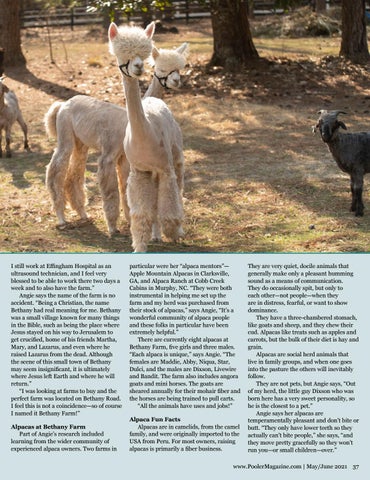I still work at Effingham Hospital as an ultrasound technician, and I feel very blessed to be able to work there two days a week and to also have the farm.” Angie says the name of the farm is no accident. “Being a Christian, the name Bethany had real meaning for me. Bethany was a small village known for many things in the Bible, such as being the place where Jesus stayed on his way to Jerusalem to get crucified, home of his friends Martha, Mary, and Lazarus, and even where he raised Lazarus from the dead. Although the scene of this small town of Bethany may seem insignificant, it is ultimately where Jesus left Earth and where he will return.” “I was looking at farms to buy and the perfect farm was located on Bethany Road. I feel this is not a coincidence—so of course I named it Bethany Farm!” Alpacas at Bethany Farm Part of Angie’s research included learning from the wider community of experienced alpaca owners. Two farms in
particular were her “alpaca mentors”— Apple Mountain Alpacas in Clarksville, GA, and Alpaca Ranch at Cobb Creek Cabins in Murphy, NC. “They were both instrumental in helping me set up the farm and my herd was purchased from their stock of alpacas,” says Angie, “It’s a wonderful community of alpaca people and these folks in particular have been extremely helpful.” There are currently eight alpacas at Bethany Farm, five girls and three males. “Each alpaca is unique,” says Angie. “The females are Maddie, Abby, Niqua, Star, Dulci, and the males are Dixson, Livewire and Bandit. The farm also includes angora goats and mini horses. The goats are sheared annually for their mohair fiber and the horses are being trained to pull carts. “All the animals have uses and jobs!” Alpaca Fun Facts Alpacas are in camelids, from the camel family, and were originally imported to the USA from Peru. For most owners, raising alpacas is primarily a fiber business.
They are very quiet, docile animals that generally make only a pleasant humming sound as a means of communication. They do occasionally spit, but only to each other—not people—when they are in distress, fearful, or want to show dominance. They have a three-chambered stomach, like goats and sheep, and they chew their cud. Alpacas like treats such as apples and carrots, but the bulk of their diet is hay and grain. Alpacas are social herd animals that live in family groups, and when one goes into the pasture the others will inevitably follow. They are not pets, but Angie says, “Out of my herd, the little guy Dixson who was born here has a very sweet personality, so he is the closest to a pet.” Angie says her alpacas are temperamentally pleasant and don’t bite or butt. “They only have lower teeth so they actually can’t bite people,” she says, “and they move pretty gracefully so they won’t run you—or small children—over.”
www.PoolerMagazine.com | May/June 2021 37







